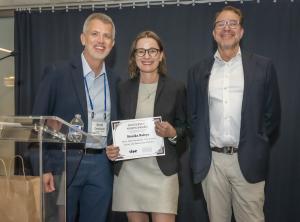By John Wallis
Every two years, SIOE hands out the Douglass North Best Book Award, for the best published book in institutional and organizational economics published during the previous two years.
This year, the Douglass North Prize committee was composed Sumner LaCroix, Michael Kosfeld, and John Wallis, the chair. The committee received seven nominations, all interesting and relevant books. After careful consideration, we focused on two books that best fit the criteria for the North Prize. They are "Seeking Supremacy," by Yasser Kureshi and "After Authoritarianism," by Monika Nalepa.
Both books are published by Cambridge University Press. "Seeking Supremacy" examines the role of the judiciary in post-independence Pakistan, while "After Authoritarianism" considers the problem of transitional justice: how to treat the former members and collaborators of an authoritarian regime after a transition to democracy has occurred. While using very different methods, both books are worthy of recognition.
The committee ultimately decided to award the Douglass North Prize to Monika Nalepa’s "After Authoritarianism." The central insight of "After Authoritarianism" is that while transitional justice has been widely studied in the last half century, from an institutional perspective the way transitional justice is administered involves two very different institutional forms. The first is purging the government of members of the previous authoritarian regime. The second is seeking to uncover both the members of the authoritarian regime and their collaborators, in the form of truth commissions and lustration. Based on a thorough collection of cases and details about democratic transitions and an insightful theoretical analysis of the two institutional forms, Nalepa concludes that while “new democracies embarking on transitional justice ought to tread lightly when it comes to purging their ancien régimes of known collaborators. At the same time, when it comes to dealing with acts of secret collaboration, transparency mechanisms – such as truth commissions, but especially lustrations – can be used without such limitations.”
Congratulations.

